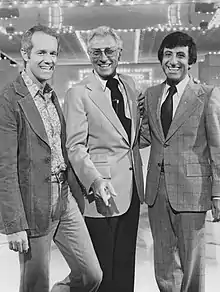Stumpers (game show)
Stumpers! is a game show hosted by Allen Ludden that aired on NBC from October 4 to December 31, 1976.[1] Lin Bolen, former head of NBC Daytime Programming, developed the show. Bill Armstrong was the program's regular announcer, with Charlie O'Donnell filling in for several episodes. The show featured game play similar to Password, with two teams (consisting of one celebrity and one contestant) attempting to guess the subject of puzzles based on clues provided by their opponents.
| Stumpers | |
|---|---|
 | |
| Created by | Bill Barr Lin Bolen |
| Directed by | Marty Pasetta Jeff Goldstein |
| Presented by | Allen Ludden |
| Narrated by | Bill Armstrong Charlie O'Donnell |
| Country of origin | United States |
| No. of episodes | 65 |
| Production | |
| Executive producer | Lin Bolen |
| Producer | Walt Case |
| Running time | 26 minutes |
| Production company | Lin Bolen Productions |
| Release | |
| Original network | NBC |
| Original release | October 4 – December 31, 1976 |
The series premiered and ended on the same dates as 50 Grand Slam, which immediately followed Stumpers! on the NBC schedule and was hosted by Tom Kennedy.
Main game
Two rounds were played. The object of the game was to solve a "stumper", which was a puzzle consisting of three clues to a person, place, or thing. In round one, each member on a team gave clues to their opposing counterpart (contestant gave clues to contestant, celebrity to celebrity). The clue-giver was shown the three clue words, but not the answer, and read out the one they thought would be least likely to help their opponent guess the stumper.
After each clue was given, the opposing player had five seconds to provide as many guesses as they could. If they failed to solve the stumper, the process was repeated with a second clue, then the third if necessary. A correct guess awarded 15 points on the first clue, 10 on the second, and 5 on the third. If the opposing player could not solve the stumper after the third clue, the clue-giver and their partner could score 15 points with a correct guess.
The first round consisted of four stumpers, with each celebrity and contestant giving clues for a different one. For the second round, two stumpers were played with all point values doubled, and either member of the receiving team could guess after each clue. At the end of two rounds, the higher-scoring team won the game and advanced to the Super Stumpers bonus round.
Ties were broken with one final stumper in which the host read one clue at a time, with anyone from either team able to buzz in. A correct guess won the game, while a miss gave the opposing team a chance to guess. If no one solved the stumper after the third clue, a new one was played.
Bonus round ("Super Stumpers")
The contestant had 60 seconds to solve 10 stumpers in a particular general category, based on clues given by the celebrity. The clues were displayed on a screen above the contestant's head, and the celebrity gave one at a time, trying to give the most helpful clues first. After hearing a clue, the contestant had to say "clue" in order to receive the next one; if the celebrity gave a clue without being thus prompted, the stumper was thrown out and the team forfeited their chance at the top prize. The contestant could offer multiple guesses, and could pass on a stumper and return to it after playing through all 10 if time permitted.
The contestant won $10,000 for guessing all 10 stumpers, or $100 per correct answer otherwise.
Two complete games were played per episode. Contestants could stay on the show until they were defeated or won Super Stumpers twice.
Episode status
Due to NBC's practice of wiping, the status of the entire series is unknown. The premiere and finale exist, along with another episode from December 1976.
References
- Hyatt, Wesley (1997). The Encyclopedia of Daytime Television. Watson-Guptill Publications. p. 413. ISBN 978-0823083152. Retrieved 22 March 2020.